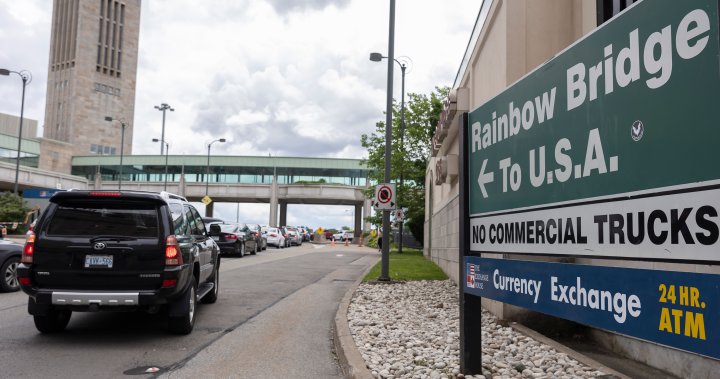Jobs
Government considering blocking low-wage temporary foreign workers | CBC News
Employment and Workforce Development Minister Randy Boissonnault told business associations Tuesday that the federal government is considering refusing temporary foreign worker (TFW) applications under its low-wage stream, his office told CBC News.
The policy change would apply to jobs that pay below the median hourly wage in each province and territory. That median wage varies by jurisdiction, ranging from $24 per hour in Prince Edward Island and Nova Scotia to $39.24 per hour in the Northwest Territories.
“I’ve been clear over the last year, abuse and misuse of the TFW program must end. The health and safety of temporary foreign workers in Canada is a responsibility I take very seriously,” Boissonnault said in a media statement.
“Bad actors are taking advantage of people and compromising the program for legitimate businesses. We are putting more reforms in place to stop misuse and fraud from entering the TFW program.”
The minister’s Tuesday meeting included representatives from the food and beverage, transportation and agriculture industries.
CEO of Food and Beverage Canada Kristina Farrell attended the meeting. She said businesses in the food processing sector are worried about the prospect of seeing their applications for low-wage stream TFWs turned down.
“Obviously if that applied to food and beverage manufacturing, it would be a crisis,” she told CBC News. “At the end of the day, that would have an impact on the price of food.”
Farrell said it’s hard to estimate the amount of TFWs in working in food processing because the numbers can vary greatly year to year.
More than $2 million in fines were issued under the TFW program in the 2023-24 fiscal year, a 36 per cent increase over the previous year.
Immigration lawyers, agencies and consultants have been raising the alarm over bogus labour market impact assessments (LMIA) being sold for tens of thousands of dollars.
“We have seen amounts ranging from $30,000 to $50,000, $60,000 being charged for these positive LMIAs by those employers,” Manan Gupta, president of Brampton, Ont.-based Skylake Immigration, told CBC News.
An employer looking to hire a TFW must submit a labour market impact assessment to the federal government to show it could not find a qualified Canadian to fill the job within 28 days. The standard processing fee for this file is $1,000 and is supposed to be covered by the employer.
Canadian businesses were given the green light to fill roughly 240,000 jobs with temporary foreign workers in 2023, more than twice as many as they were a half-decade earlier. CBC’s Paula Duhatschek looks at the divided opinions and experiences behind the surging numbers.
Gupta said that these fraudulent LMIAs are sold to give individuals higher scores on Canada’s express entry immigration system.
Agriculture is still the sector employing the most TFWs, but several other sectors — including nurse aides, food service support and construction — have seen major increases in the number of TFWs they employ since 2018.
“If you look at the numbers, many of these abuse stories we hear from the food and restaurant sector, from the hospitality sector, even in the supply chain industry, because many of these sectors are able to show to the decision makers that there is an acute shortage of professional workforce,” Gupta said.
While the sum of fines issued under the TFW has increased through enforcement measures, Gupta said boosting enforcement is the best way to weed out bad actors.
“The government knows that there is a lot of loopholes, there is lot of abuse. The proof will be in the pudding, what comes ahead and what kind of enforcement measures the government does finally take,” Gupta said.
Boissonnault’s office said that during his meeting with industry associations, the minister outlined a number of measures the government has introduced or is considering to curb abuse of the system.
They include applying stricter oversight in “high-risk areas” when processing LMIAs, a possible hike in LMIA application fees and enforcing “consistent application” of the rule that says TFWs cannot make up more than 20 per cent of a company’s workforce.
Restaurants Canada is one of the industry groups that took part in the meeting. CEO Kelly Higginson said that prior to the COVID-19 pandemic, about one per cent of their membership’s labour force were TFWs; that figure climbed to three per cent post-pandemic.
A report from a trade union group argues B.C.’s construction sector is too reliant on temporary foreign workers. It says that’s bad for local workers’ wages and the rights of workers from abroad. As Liam Britten reports, one foreign worker in Vancouver is calling for more rights, and a chance to become Canadian.
She said that temporary foreign workers aren’t a hiring priority in the broader restaurant industry but are essential in areas where tourism is a key economic driver.
“I suspect at this point that the … minister’s office is very aware of the need for this stream within these geographically particular areas. It would be very detrimental without the TFW program … tourists and residents wouldn’t have local coffee shop accesses as often,” Higginson said.
“There would be other vital services that they’re going to want and need for their communities to be vibrant and attractive to support the local economy.”
Higginson added that restaurants are a $115 billion industry in Canada and this policy change could have a severe effect on tourism economies.
Overall, Higginson said Restaurants Canada is “very supportive” of stricter oversight for LMIAs.
“There’s been the odd operator that [doesn’t] follow the rules … really, they have no place in our industry and we support strong penalizing of these people,” she said.
The amount of TFW applications being approved has grown significantly in recent years. Last year 239,646 were approved, more than double the rate of 2018 with 108,988. In 2022, 222,847 applications were approved, an increase of over 89,000 from the previous year.
One in 10 temporary foreign workers made less than $7,500 annually in 2019, according to a Statistics Canada report published in May.











